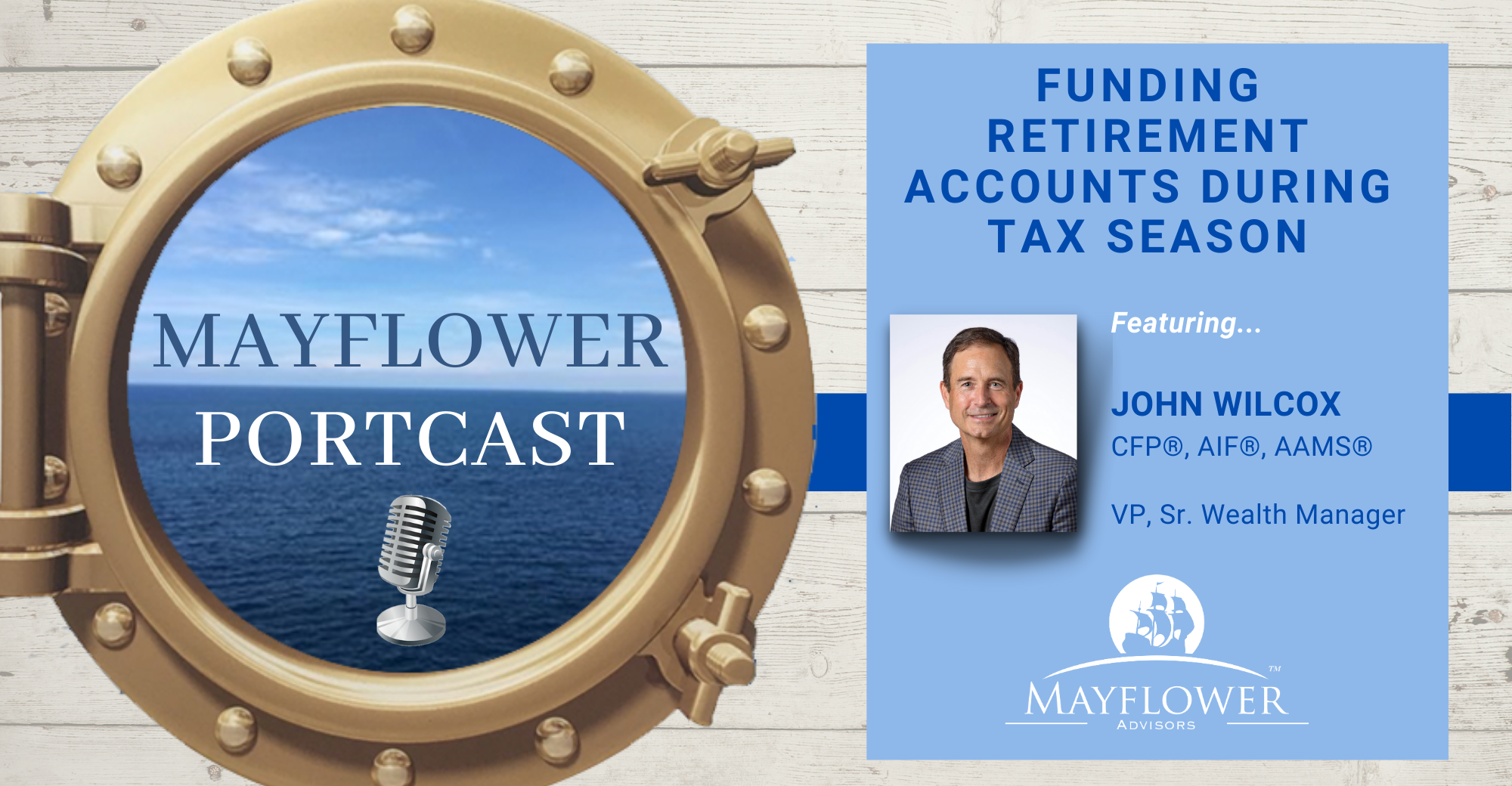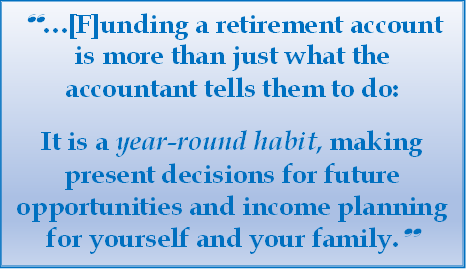Funding Retirement Accounts During Tax Season

Funding Retirement Accounts During Tax Season: Transcript
There’s no doubt about it: COVID has upended many aspects of life this past year, and household finances are no exception. Recent data notes that nearly 15% of Americans with retirement savings accounts like 401(k)s and individual retirement accounts capped those funds over this past year—with another 13% noting the need and intent to do so in the imminent future.
Those numbers paint a discouraging picture, but there is finally a glimmer of hopeful light at the end of this coronavirus tunnel, and there is no time like the present to re-evaluate your retirement savings strategy to be sure you are doing all you can to make the most of that hard-earned money.
I’m Brandy Chetsas, Communications Director here at Mayflower Advisors, and I’m delighted to introduce our inaugural Mayflower Portcast, offering a new world perspective on financial education. My colleague and friend John Wilcox is joining me today to discuss funding retirement accounts during tax season.
John, a Senior Wealth Manager at Mayflower Advisors, is also an Accredited Asset Management SpecialistSM (AAMS®), CERTIFIED FINANCIAL PLANNER™ Professional (CFP®) and Accredited Investment Fiduciary® (AIF®)). He has been recognized multiple years as a “Five Star Wealth Manager” and among 401(k) Wire’s “Most Influential Advisors” and Plan Adviser’s “Top Advisors.”
There’s a laundry list of accolades in education I could note, but the bottom line is that John knows a lot about making smart, short and long-term financial decisions. More importantly, he has dedicated those decades of experience through all kinds of markets—and global pandemics, helping businesses families and individuals plan for and achieve their financial retirement and investment goals. An avid competitive tennis player, he is also a member of the U.S. Professional Tennis Association and U.S. Tennis Association and carries high local, national and even international rankings.
John shares that commitment with others by donating lessons to a variety of non-profit organizations. He is a driven and busy guy on a mission to educate and help people work smarter, not harder when it comes to money management. John, it is a pleasure to have you here today to learn more about this important topic. Welcome!
John Wilcox: Thank you very much, Brandy. That was a great introduction. Retirement planning during tax season and, frankly, all year long is an important thing. The reality is people generally wait until their accountant tells them what to do before tax season.
In the last couple of years though, we have had an evolving tax season that has created both a problem and an opportunity in funding retirement accounts. The good news is that this year, especially with the new tax filing deadline of May 17th, we have a little more time to prepare.
The reality is that people think about this all year long—then they wait for their accountant to tell them what to do. But funding a retirement account is more than just what the accountant tells them to do: It is a year-round habit, making present decisions for future opportunities and income planning for yourself and your family.

I think that is what needs to be looked at. You are always making decisions to fund retirement, despite shorter-term tax consequences. You need to consider potential consequences to know exactly what to be funding. Those are the areas that we help with at Mayflower Advisors.
Brandy Chetsas: What are some of those considerations, specifically this year? What should people be doing differently in conversations with their tax professionals?
John Wilcox: I think if you are going to get a deduction, the real question is are you funding something with your employer plan? If you have an IRA, is the IRA a better vehicle than the Roth? Are your income levels too high to fund a Roth? For example, a high-earning family is going to have a restriction on a Roth individually, but at their employer plan there are no restrictions in a Roth provision. That is something to consider.
Also, are you going to run an extension through October and possibly fund even more if you are self-employed? Self-employed individuals have a different scenario than somebody that’s employed. If you are in a retirement plan at a company, your situation is different. You are already getting the pre-tax deductions. If your accountant tells you are not going to get a deduction, maybe the Roth is a better vehicle for this year if you are not over the threshold.
There are a lot of considerations, but one of the most important is to remain consistent: Being consistent can get you to where you need to be—regardless of the tax deduction or non-deduction. Your funding strategy becomes the most important thing to consider this time of year.
Brandy Chetsas: So funding retirement accounts really has very little to do with tax-related calendar markers?
John Wilcox: Right, it is a healthy habit approach. For example, if you fund $10,000 in your retirement plan at your employer, but you have an additional amount that you can fund for retirement to get your household a deduction, so be it. Go with it!
Let’s say you don’t get the deduction, maybe a Roth is more appropriate; but you are staying consistent. I always say that if you get a raise from your employer and it is a humble 2%, 1% should go towards your future and 1% towards your current lifestyle. We want to create two happy people: Your current lifestyle and your future lifestyle. That’s one of our goals in terms of lifestyle planning and retirement as you transition from your higher earning years and closer to that time frame. Those rules are made to help you out.
For example, if you are over 50, you can put more in because you are getting closer to retirement. Those are some of the considerations that you should think about with funding strategies. If your employer gives you a raise, it is not all for the flat screen TV. You will also want to prioritize an event in the future. That is really important.
Brandy Chetsas: I like that approach—the balance between immediate and long-term gratification … maybe a smaller flat screen TV?
John Wilcox: I use the flat screen TV example, but the reality is a lot of times we end up buying things that we really do not need. I prefer people to think about plan for your future in events, rather than things. It just becomes a more important funding concept and spending time with those that you care about the most.
Brandy Chetsas: That’s a good way to look at it. How about in terms of tax liabilities and those kinds of issues?
John Wilcox: You should always check with your CPA. We do not give tax advice but do share tax peripheral thoughts. You will always want to consider where your funding strategy falls. If you are going to get a benefit to allow you and your family to keep more of your money, by all means use the tax code to your favor.
You need to be thinking about those things—the amount that you can deduct or the amount that you need. How much do you need to live on to sustain, for example, a married-couple scenario for two people into their 90s (because the longevity numbers are much greater)? Sometimes, we see it could take $3-4 million to fund retirement for an individual or a family. It just depends on the lifestyle that they are adjusting to or currently living as they move into that chapter of life.
Brandy Chetsas: I would imagine that this something that resonates with everybody—wanting to make sure that we provide for those we love and to leave a legacy that includes foundational strength and security. That is good guidance, John.
In the beginning of our conversation, you mentioned the tax-filing delay until May. Is there anything that would be advantageous to consider or adjust?
John Wilcox: I always find that time is your best friend when you get a delay; but it also is an opportunity for people to procrastinate, which is terrible. The upside is that this gives you a little bit more time to budget for your funding. If, perhaps, you did not have the funds available for the standard April 15th deadline, now you have a little bit more time to raise the funds—working closely with your CPA and knowing what those numbers are.
If you were previously going to do an extension, now you might not need to with the extra month. Maybe you don’t need the full delay all the way until October to fund something for a self-employed individual; maybe May is suitable this year.
Brandy Chetsas: This is a good reminder for someone like myself that it really is great to have someone in your corner—in fact, a professional support team that know all the ins and outs of these important details to make sure you’re checking off all the boxes.
John Wilcox: Over the last two years we learned that we were sort of stuck on the April 15th and October 15th time frames. These past two years have shown us that those are adjustable. It is amazing that they have adjusted those dates.
You do want to work with a professional advisor, your account, your trusted experts and you want your family to understand that impact. Always be ready and nimble to adjust in these situations. I think that is one of the lessons from the last couple of years.
Brandy Chetsas: Very true, and I would say we have adjusted quite well. Nothing is set in stone anymore, right?
John Wilcox: That’s right.
Brandy Chetsas: For people that might be listening to this that have not yet given serious thought to funding retirement accounts… You talk to people every day with every imaginable scenario. When is the best time to get started? I feel a sense of urgency—is it ever too late? How do you advise your clients?
John Wilcox: The reality is that it is never really a bad time. Right now is a good time no matter how old you are because saying that first goal: For every $1,000 that you save for retirement, that represents around $40-50 of income that can pay you over the course of 12 months. If people start thinking in terms of what their funding strategy represents in terms of income, that is really when they start thinking why the goal is so important. For every $100,000 you raise, that is an additional $4,200 of income potentially in the future, for every $1 million, that is an additional $42,500 in income, etc.
You start thinking in those terms: What does that represent in terms of income at a given point when the paycheck stops—meaning the work, the employer, whatever it is that you do… Understand that whatever occupation you are in, the portfolio is ultimately going to be paying part of your retirement in addition to Social Security and other things that come up.
Brandy Chetsas: That makes so much sense. Your explanation makes it feel less burdensome and simply more exciting—taking abstract dreams and giving feet to them, making them a solid plan. It does not have to be a sacrifice to be putting that money away: It is just investing in your future self!
John Wilcox: Think of it this way: You said, “I saved $1,000 for retirement.” That represents not a lot of money in terms of divided by 12 for your future income planning. If you break it down like that, you start realizing that for every $1,000 you raised for your future and your retirement, this represents an additional amount of income for your future.
When we start thinking about a $3 million ultimate goal, that is a little frustrating and overwhelming. But if we start understanding that the little actions make significant differences in life… That makes all the sense in the world. Start looking at it like biting off little chunks, as opposed to worrying about the big number that you have to achieve.
Brandy Chetsas: Just like anything in life, the first step: All these actions are simply a gift to yourself.
John Wilcox: Yes, and right now is the best time to start. The bottom line is that you need to spend time taking care of your future by making prudent decisions in the present.
Brandy Chetsas: That’s such good advice, John. I learn every time we talk—and taking my own notes. I hope that it is the same for our listeners. You always make it sound feasible. Thank you for that and thank you listeners for taking the time to be with us today.
It is important to note that this material is prepared for informational use only, gathered from sources believed to be reliable. But it may be subject to updates, so listeners are advised to seek professional accounting tax and legal assistance to address their unique considerations. Mayflower Advisors does not provide accounting tax or legal advice.
We hope you enjoyed our Mayflower Portcast content and found it useful. Please let us know if you have any ideas for future episodes at communications@mayfloweradvisors.com. This has been Brandy Chetsas and John Wilcox from Mayflower Advisors. Thanks again for joining us!
All information contained herein is informational in nature and not intended as individualized financial, legal or tax advice. Wealth management and financial planning decisions are complex and fluid and should be structured around each client’s unique situation and needs. Parties should carefully consider all related benefits, risks and costs and speak to their trusted advisors before making any significant decisions. Listeners are advised to seek professional accounting tax and legal assistance. Mayflower Advisors does not provide accounting tax or legal advice.
